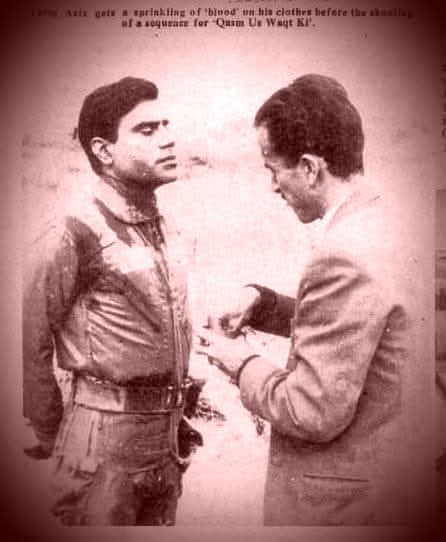“Qasam Us Waqt Ki” (1969) — A Landmark of Pakistani Cinema

In 1969 Pakistani cinema presented two memorable films: Zarqa by Riaz Shahid and Qasam Us Waqt Ki by A. J. Kardar. Both were widely praised, but Qasam Us Waqt Ki stands out as a high-calibre, mission-driven production — a patriotic film made with substantial resources and strong institutional cooperation.
Plot Overview
The story follows an air force pilot and opens with a dramatic crash landing. Squadron Leader Javed (played by Tarik Aziz) returns after shooting down five enemy aircraft, only for his plane to crash on the way back. Seriously wounded, he is rushed to hospital where his fate hangs in the balance. Around his bedside stand his mother (Surren Lata), his sister (Rozina), his beloved (Shabnam) and his friend Mohsin Imam — who is also a pilot. The remainder of the film unfolds against the bloody backdrop of war, portraying a nation gripped by the struggle between life and death, where commanders and commoners alike face the same ordeal.
Theme and Tone
Qasam Us Waqt Ki is a redemptive tale of courage and sacrifice. It celebrates bravery on the battlefield and honours those who gave their lives for duty. The film is a heartfelt tribute to the dedicated air warriors and their devotion to country.
Production & Collaboration
This was the first Pakistani film to receive full cooperation from the Pakistan Air Force during filming and preparation. The movie was produced by National Studios Limited under the direction of A. J. Kardar, who also wrote the screenplay. The story credits go to Wing Commander Shahid Hussain and Professor Ahmad Ali. Dialogue writers included Z. A. Bukhari, Wing Commander Shahid Hussain, and Daud Khan Majlis.
Cinematography & Style
International cinematographer Maron Marshall brought a Hollywood visual sensibility to the film — a new breath of freshness within Pakistan’s then-outdated cinematic milieu. Several aerial sequences were shot by Squadron Leader A. R. K. Bukhari, adding authenticity and scale to the film’s airborne scenes. Kardar’s meticulous direction is evident in every shot and frame; he is among the directors who rehearsed and filmed each scene with intense technical care. The film also introduced elements described as a “microcosmic study,” a technical and thematic novelty that distinguished it from many contemporaries.
Music & Lyrics
The film’s music was composed by Sohail Rana, Khan Ata-ur-Rahman, Rafiq Ghaznavi and the master Nathu Khan. Poets and lyricists who contributed included Faiz Ahmed Faiz, Josh Malihabadi, Khan Ata-ur-Rahman and Fayyaz Hashmi. The film’s title song — composed and written to evoke patriotic fervour — became an emblem of the movie’s emotional power. The chorus line, repeated through the film at fitting moments, was recorded by singer Mujeeb-ul-Alam. A translated excerpt of the refrain reads:
“I swear by the moment when life turns —
from our hands the world is reshaped into a new tragedy.”
Cast
The ensemble included Tarik Aziz, Shabnam, Rozina, Rozi, Mohsin Imam, Fareeda Khanum, Mania, Prince Taj, Saeqa, Ajmal Huda, Sethi, Shahjahan and Surren Lata. Qasam Us Waqt Ki premiered on 12 December 1969 at Nashat Cinema in Karachi and was distributed in Pakistan by Ever Ready Pictures.
Legacy
Qasam Us Waqt Ki remains an important chapter in Pakistan’s cinematic history — notable for its patriotic subject, technical experimentation and institutional cooperation. It stands as a cinematic salute to the air force and to the many who sacrificed in the line of duty.
On set: Tarik Aziz prepares for a scene where his uniform is spattered with simulated blood — a glimpse into the film’s dramatic realism.
Source: translated from Urdu text (anonymous) — Exalogics editorial translation.